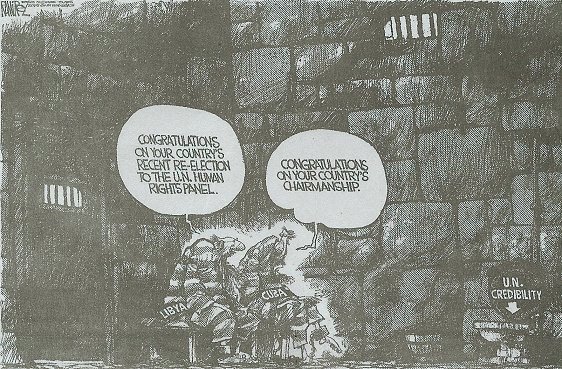|
There are deaths that weigh no more than a feather. Entire peoples who don't count. They have only one right, the right to disappear. They are absent from our concerns and from our television screens, even before the tanks, the bombs, the raids and the landmines reduce them to nothing. The Chechens live in absolute solitude, surrendered to the pleasures of a massacring Russian army. And no one -- not the United Nations, not world public opinion, not any one of the democracies that are so proud of their principles -- cries bloody murder!
Neither of the conflicts that has gotten the attention and sympathy of the world -- Iraq or Palestine -- is as cruel as this one. The Chechen nation counts barely a million individuals, of whom between 100,000 and 200,000 have died at the hand of the Russian army, which first invaded in 1994 and left a few years later, humiliated. To celebrate the millennial year 2000, President Vladimir Putin sent the troops back and razed the Chechen's capital Grozny, and transformed their tiny country into permanent hell. The few travelers who risk the ire of the authorities to visit Chechnya (and I was one of them) bear witness to the worst of the worst that dishonors this good year of 2003.
On Sunday, presidential elections organized by Moscow will take place on this devastated terrain. No one lends them legitimacy. Not even the Kremlin. Its candidate, Akhmad Kadyrov, the current chief of the pro-Russian administration, enjoys feeble popularity (13%). Bought or threatened with death, all of the competitors capable of challenging him have backed off or are forbidden to run. As for the people, pushed towards the ballot boxes with a Kalashnikov, they know that it's not the ballots that will decide, but rather the armed man who will count and invent them (200,000 dead Chechen "souls" are on the electoral lists).
| |
|
|
|
Such a farce fools no one, not the Chechens, not the Russians, nor the Europeans.
What good are such theatrics? Well, this staged election is a useful operation by which Moscow sends a triple message:
To the Chechens, the occupying army -- 100,000 men -- and the collaborationist Chechen militia say that the war will be fought to the finish. No question of negotiating with the non-Islamic independence movement or with former President Aslan Maskhadov, who was elected under the auspices of the OSCE but is now on the run. Given the habits of candidate Kadyrov's own secret police, whose cruelty sometimes scares the Russian "services," Sunday's vote will force the Chechen voter to sign his own sentence to either death or servitude.
To the Russian population of Chechnya (of whom a majority, according to recent surveys, is favorable to negotiations with Mr. Maskhadov), the Kremlin sends an implicit ultimatum: If you don't obey orders, you too will be treated as rebels. From Nicolas I, to Stalin, to President Putin, there's an implacable continuity: Colonial war in the Caucasus turns inexorably into the extermination of the local people, put to the sword, deported to the last man, villages razed, pogroms, blood and ruins.
Why so much cruelty? The great Russian writers revealed the secret: It's an educational exercise. The Chechen incarnates the spirit of resistance. Over the centuries, the Kremlin has bled Chechnya and made it a model for the rest of Russia, forced to submit to the central powers-that-be. The Russian autocracy is born and born again in the very exemplary laying- to-waste of a little people.
| |
|
